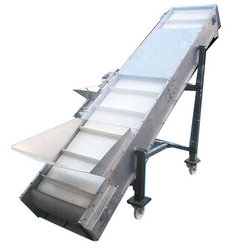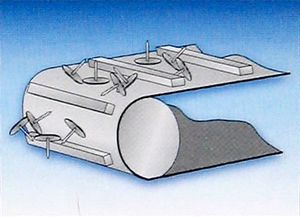Difference between revisions of "Cleated Belts"
Jump to navigation
Jump to search
(Created page with "Category:Belt Conveying{{Knoppen}} <noinclude><!------------------------------------------------ * READ THIS FIRST * Only edit this page if you can improve the content. * Im...") |
|||
| Line 7: | Line 7: | ||
* Please start editing this page after the /noinclude | * Please start editing this page after the /noinclude | ||
* -------------------------------------------------></noinclude> | * -------------------------------------------------></noinclude> | ||
[[File:Cleated-belts.jpg|thumb|right|Cleated Belts]] | |||
[[File:Cleated-belts1.jpg|thumb|right|Cleated Belts for Small Pulleys and Nose Bars]] | |||
'''Cleated Belts''' are commonly used to control product on a horizontal or inclined conveyor.Cleated belts help convey loose, large or awkward objects up inclines. When a roughtop is not enough, a cleated belt becomes the practical solution. The T cleat is the most popular and is available up to 3” high and a heavier profile known as the Beefy cleat, for those tougher applications. | |||
Guides may be placed on the top or bottom of a belt to aid in the tracking or reduce spill over. Various styles are available to suite the application. Guides may also be used in place of cleats when the system will not allow clearance for the regular taller T or Beefy cleats. | |||
Latest revision as of 11:18, 18 August 2012
Cleated Belts are commonly used to control product on a horizontal or inclined conveyor.Cleated belts help convey loose, large or awkward objects up inclines. When a roughtop is not enough, a cleated belt becomes the practical solution. The T cleat is the most popular and is available up to 3” high and a heavier profile known as the Beefy cleat, for those tougher applications.
Guides may be placed on the top or bottom of a belt to aid in the tracking or reduce spill over. Various styles are available to suite the application. Guides may also be used in place of cleats when the system will not allow clearance for the regular taller T or Beefy cleats.

